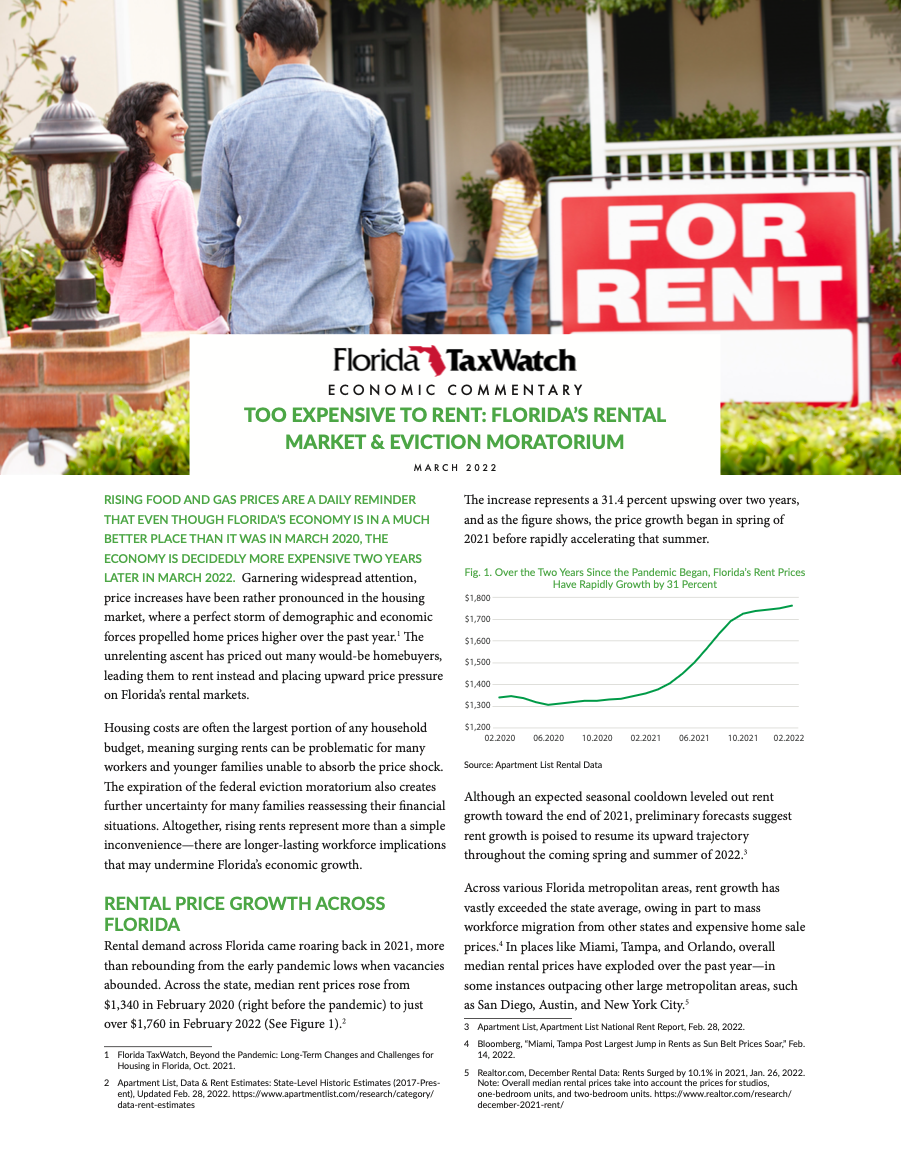TOO EXPENSIVE TO RENT: FLORIDA’S RENTAL MARKET & EVICTION MORATORIUM

Rising food and gas prices are a daily reminder that even though Florida’s economy is in a much better place than it was in March 2020, the economy is decidedly more expensive two years later in March 2022. Garnering much attention, price increases have been rather pronounced in the housing market, where a perfect storm of demographic and economic forces propelled home prices higher over the past year. The unrelenting ascent has priced out many would-be homebuyers, leading them to rent instead and placing upward price pressure on Florida’s rental markets.
Rental demand across Florida came roaring back in 2021, more than rebounding from the early pandemic lows when vacancies abounded. Across the state, median rent prices rose from $1,340 in February 2020 (right before the pandemic) to just over $1,760 in February 2022 (See Figure 1). The increase represents a 31.4 percent upswing over two years, and as the figure shows, the price growth began in the spring of 2021 before rapidly accelerating that summer. Although an expected seasonal cooldown leveled out rent growth toward the end of 2021, preliminary forecasts suggest rent growth is poised to resume its upward trajectory throughout the coming spring and summer of 2022.
Across various Florida metropolitan areas, rent growth has vastly exceeded the state average, owing in part to mass workforce migration from other states and expensive home sale prices. In places like Miami, Tampa, and Orlando, overall median rental prices have exploded over the past year—in some instances outpacing other large metropolitan areas, such as San Diego, Austin, and New York City.
To some degree, higher rent prices are a natural symptom of a strong economic recovery as more employment inevitably fuels housing demand. Long touted for its robust job creation, low-tax environment, and natural amenities, Florida benefitted throughout the pandemic by attracting individuals away from pricier regions up north and out west. Even though pandemic-induced migration brought a steady influx of new residents and workers to the Sunshine State, it also placed additional pressure on regional rental markets with limited capacity.
Affordability is a core concern when it comes to rapid rent growth, impacting working families and local businesses. According to the United Way, there were more than 3.6 million households in Florida that were Asset Limited, Income Constrained, Employed (ALICE) when COVID-19 hit. These households possess incomes above the federal poverty level but often do not have sufficient income to cover necessities like housing, child care, and transportation. Based on a 2021 Florida survey, 76 percent of ALICE respondents signaled their biggest concern throughout the pandemic was paying for housing expenses (e.g., rent, utilities). The response was the second-highest only to contracting COVID.
Even with wages growing across industries, many occupations may not be able to afford the rapid rise in rental prices. This disconnect can severely hamper attainable workforce housing efforts in the state to support critical workers like nurses, teachers, and police officers. For local businesses and communities, the lack of affordable workforce housing can prevent service industry sectors from acquiring talent and can lead to many younger individuals (e.g., young professionals, early career families) moving away.
Due to the pandemic’s disproportionate impact on low-income and asset-limited families, the federal eviction moratorium sought to protect tenants from homelessness, halting evictions while in place. The federal moratorium was in place from September 2020 to late August 2021.18 Although most tenants were able to maintain steady rent payments, some 15 percent of renter households nationwide were behind in the third quarter of 2021. In Florida, the moratorium’s end has not precipitated a sudden deluge of evictions across the state; however, it remains unclear whether this is due to an ongoing backlog in the court system and whether eviction rates will steadily pick up in the months ahead.
For the remainder of 2022, expect rent growth to continue its ascent, albeit at a slower pace than last summer. At the national level, forecasts suggest rent growth of 7.1 percent throughout 2022, somewhat higher than home price growth. In some Florida metropolitan areas, rent growth will likely exceed national estimates and may maintain double-digit growth rates. A lot will depend on developments in the housing for-sale market. Interest rate hikes will likely affect mortgage rates, perhaps forestalling the unprecedented climb in home prices that are currently pricing out many potential homebuyers. Eviction rates may be finally picking up after months of little change, but data are very preliminary at the moment.
Expensive rent growth is a critical issue for Florida’s future economic growth. Especially for young professionals, being priced out of certain markets may lead to outbound migration from the state over time. And since the pandemic has shown that where one works and where one lives can be different, this may further incentivize movement to more affordable regions in the U.S. For many local communities adapting to workforce challenges, these long-term concerns are important to consider as Florida’s economic recovery continues.